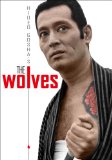| Reviews & Columns |
|
Reviews DVD TV on DVD Blu-ray 4K UHD International DVDs In Theaters Reviews by Studio Video Games Features Collector Series DVDs Easter Egg Database Interviews DVD Talk Radio Feature Articles Columns Anime Talk DVD Savant Horror DVDs The M.O.D. Squad Art House HD Talk Silent DVD
|
DVD Talk Forum |
|
|
| Resources |
|
DVD Price Search Customer Service #'s RCE Info Links |
|
Columns
|
|
|
Wolves, The
AnimEigo // Unrated // September 2, 2008
List Price: $24.98 [Buy now and save at Amazon]
Taking both Kurosawa and Kobayashi's color work fully into consideration, I still think I'm more of a black-and-white Tatsuya Nakadai kind of guy. There's a certain wildness in his eyes that pours through so well in the classic monochrome photography of films like Sword of Doom and Hara Kiri. Yet, in Hideo Gosha's The Wolves, something compelling stands out about the lack of animosity present in his gazes -- well, most of them. Amid early 20th century gangster politics and testosterone-infused conflict displayed in brash full color, his strained presence adds a different form of hunger to Gosha's hard-boiled and slow trotting dissection of early-release criminal gangsters.
The Film:
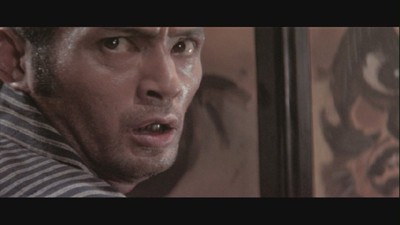
While plot is as important as a framework here, The Wolves relies on minimized story complication to allow for an engrossing level of dramatic craftsmanship. Set in late '20s Japan, the film focus closes in on the rise of the Showa Era and its new Emperor's grant of freedom to over 400 prisoners. While this relieved many who grasped the negatives of their wrongdoing, it also sent many criminals back into the wild that hadn't cultured themselves to the errors of their ways. Gosha's film follows several of these individuals as they integrate back into the Yakuza (Japan's long-standing organized crime syndicate) way of life, several of which were involved in the huge, brutal brawl depicted at the start of the film.
As Seji Iwahashi (Tatsuya Nakadai) slowly returns to his old life, empty and pensive as he may be, he discovers that the infrastructure of his organization has changed since his time in prison. Yet, even though the players of the game are different and provide a difficult acclimation back into the syndicate, it's still more of the same type of political nonsense between rival gangs that he grew accustomed to many years ago. Iwahashi discovers that his old boss has died, which occurred in rather ambiguous fashion, and a new leader has taken the helm. After showing grievous respect for his prior boss and haphazardly waltzing back into his organization, Iwahashi attempts to regain the rhythm of those rather stilted gangster mannerisms of the past.
Gosha has crafted a film in which little rickety mechanisms can cause many problems within the larger engine of this Yakuza syndicate. As with most gangster films of the type, little pushes on the boundaries of territorial integrity and respect can erupt in rapid bloodshed. But The Wolves' concentration on political scheming isn't there to deepen the narrative. Instead, it lays the foundation for some tense and sometimes overblown conversations between the parties at-hand in an effort to strengthen the viewer's grasp on the "family respect" mechanic. A sizable conflict then dives into the mix, that of a disruptive marriage between the two families that would "unite" them in a manner reminiscent of older culture. This lights a larger fire under the feet of each party as tension mounts towards their union at a large festival. Stealthy plotting and defensive etiquette become integral into the everyday activities of the gangsters, resulting in several thrust-and-parry theatrics.
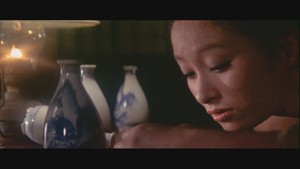
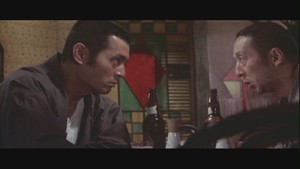
Most of The Wolves' potency, as to be expected, lies in paying discreet attention to facial mannerisms that reach profound peaks once Nakadai's Iwahashi enters in the mix. Amid a film that concentrates on the questionable release of prisoners not ready for the real world, Iwahashi falls into a division of a man who seems to wish that he were locked away for a longer period of time. Pain pours from Nakadai's eyes as Iwahashi; instead of the ineradicable anger and fraught energy that he expresses in his titular samurai roles, he's surprisingly subdued and intricately gripping to watch here. This is a good thing, considering the film's methodical tempo allows for plenty of close-quartered shots that soak in his range between pain and aggravation. There's no getting around the fact that Gosha's 1971 Yakuza film is a deliberately-paced slow burner, but it holds its tension well from start to finish with added gravitas from Tatsuya Nakadai.
Imagine The Wolves' rhythm as a pendulum's pathway in a clock; tension mounts high at the very beginning, builds a smooth yet subdued momentum through its middle, and then hits its expectedly electric highpoint at its close. Interestingly, the pendulum analogy also applies to the core theme behind the film: life can move back and forth at different times on different days, but the rhythm and the way in which the pendulum operates doesn't change with time. Momentum swings back and forth between the two rival clans, but it's always the same sort of futile activities that occurred many years passed. This pours through with the mangled "brotherhood" mentality that most Yakuza members in The Wolves display -- ever ready to blindly sacrifice their lives for the sanctity of their family. It's an interesting play on the concept that accentuates the culture's inherent self-indulgence, and a welcome differentiation from the glorifying images of gangsters in film from both yester-year (made one year before Coppola's original Godfather) and the present.
Amid the film's encapsulating core idea, you're left captivated in a concoction of chatter, rhythmic tunes from famed composer Masaru Sato, and sharply-conceived artistic cinematography from Kozo Okazaki that almost looks stolen frame-by-frame from muted post-impressionist artwork. These efforts, both in rhythmic filmmaking and beauty, assemble a surprisingly organic and terse atmosphere within the long expanses between fight scenes. I enjoyed both the moderation and the visceral nature of its scattered battle sequences, relying more on the film's familiar tension in character's faces and only mild dashes of samurai influence than intricate choreography. Gosha's The Wolves requires some patience to absorb through the prolonged spans between boisterous actions, but can be quite intriguing once you've found its genteel dramatic flow.
The DVD:
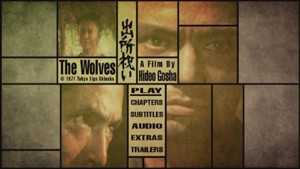
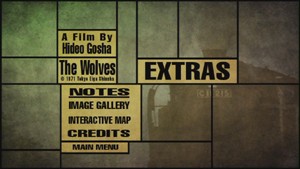
AnimEigo has once again tackled another piece of "Samurai Cinema" with The Wolves, coming in a recognizable presentation with very attractive coverart and discart.
The Video:
Those familiar with AnimEigo's transfer of Lady Snowblood will find many similar qualities in their transfer of Gosha's film. Presented in its original 2.35:1 ratio in anamorphic widescreen, The Wolves looks pretty darn good for a film of its age. Sharpness becomes the film's strongest suit, staying heavily detailed throughout. However, digital noise does flicker quite a bit in darker scenes and against the skylines in many sequences. Also, it has very light remnants of that "glass bottle" feel in the negative where some of the outer extremities curve -- but only to near-unnoticeable degrees. Along with that, the transfer also feels a hint on the stretched side, as some faces look a little wide and short on several shots. On the flipside, its sandy colors retail muted levels most of the time, but really flush the screen once a loud splash of color peaks out in the negative. Overall, the experience in watching Gosha's older Yakuza film was very satisfying, adding an abundance of personality to a very unique dramatic film.
The Audio:
Interestingly, we've got two separate treatments here: Original Audio, and Restored Audio. AnimEigo seems to have gone through and removed a "hiss" from the track, which is noticeable when comparing each track side by side. Strangely, both audio tracks exhibit a few strengths and weaknesses. With the restored track, most of the grating "hiss" has been removed, but the audio quality sounds very thin -- almost like restoring the audio scooped a bit of the attitude from the track. In comparison, the original track comes out of the gate with a bolder and throatier sound, yet it exhibits a difficulty in handling strained aural elements - in other words, a certain "hiss" that's been mentioned already. Both handle verbal clarity and musical elements fine for a film of its age, while only tickling the lower ranges here and there.
The Subtitles:
Animeigo continues their tradition of extensive English subtitles here, giving us both their trademark "Captions and Dialogue" track along with a "Dialogue Only" option for a more typical experience. Their typically multi-colored and near-perfectly layered translations are in tact here, alternating colors per speaker and all. A "Captions Only" options is also here, which only tells us in English what the contextual culture symbolism and meanings are behind the Japanese kanji and other obscure statements. Those who are conducting a Japanese language class, or those Japanese-speaking individuals without the cultural knowledge that the film discusses, can benefit from this. As to be expected, the language context of the subtitles is outstanding.
The Extras:
Film Notes:
A plethora of textual information is available here, as per other AnimEigo releases. The sections are separated into four (4) categories: Cast and Crew, The Yakuza, The Rainway, and general Program Notes. Much like Animeigo's other products, the textual material contains a huge amount of historically interesting material -- though it's much of the same kind of stuff you can find on Wikipedia or the like. Still, it's nice to have it all gathered together in one location directly after viewing.
Image Gallery:
We've also got a fairly extensive image gallery, segmented into Black and White Photos, Color Photos, and one Movie Poster. Each collection features a nice array of marketing style shots from the set. It reaffirms how solid the cinematography can be when held still frame-by-frame.
Also included is a basic Interactive Map of Japan and Manchuria, as well as the film's Credits and an anamorphic Original Theatrical Trailer running at nearly three-and-a-half minutes long.
-----
Final Thoughts:
Methodical and tense in its deliberate rhythm, Hideo Gosha's The Wolves is an engrossing and brutal piece of Yakuza-style crime politics drama. Tatsuya Nakadai's sallow disposition echoes his dramatic poise incredibly well here, giving a tense film rich with visual and musical cinematic treats a strong protagonist to focus on. There's not too many films like The Wolves that concentrate on the self-consuming nature of gang warfare in such a humanized light. AnimEigo's treatment ranges from serviceable to strong, providing a Recommended viewing and contextual experience for Gosha's little-seen gangster film.
Thomas Spurlin, Staff Reviewer -- DVDTalk Reviews | Personal Blog/Site
The Film:

While plot is as important as a framework here, The Wolves relies on minimized story complication to allow for an engrossing level of dramatic craftsmanship. Set in late '20s Japan, the film focus closes in on the rise of the Showa Era and its new Emperor's grant of freedom to over 400 prisoners. While this relieved many who grasped the negatives of their wrongdoing, it also sent many criminals back into the wild that hadn't cultured themselves to the errors of their ways. Gosha's film follows several of these individuals as they integrate back into the Yakuza (Japan's long-standing organized crime syndicate) way of life, several of which were involved in the huge, brutal brawl depicted at the start of the film.
As Seji Iwahashi (Tatsuya Nakadai) slowly returns to his old life, empty and pensive as he may be, he discovers that the infrastructure of his organization has changed since his time in prison. Yet, even though the players of the game are different and provide a difficult acclimation back into the syndicate, it's still more of the same type of political nonsense between rival gangs that he grew accustomed to many years ago. Iwahashi discovers that his old boss has died, which occurred in rather ambiguous fashion, and a new leader has taken the helm. After showing grievous respect for his prior boss and haphazardly waltzing back into his organization, Iwahashi attempts to regain the rhythm of those rather stilted gangster mannerisms of the past.
Gosha has crafted a film in which little rickety mechanisms can cause many problems within the larger engine of this Yakuza syndicate. As with most gangster films of the type, little pushes on the boundaries of territorial integrity and respect can erupt in rapid bloodshed. But The Wolves' concentration on political scheming isn't there to deepen the narrative. Instead, it lays the foundation for some tense and sometimes overblown conversations between the parties at-hand in an effort to strengthen the viewer's grasp on the "family respect" mechanic. A sizable conflict then dives into the mix, that of a disruptive marriage between the two families that would "unite" them in a manner reminiscent of older culture. This lights a larger fire under the feet of each party as tension mounts towards their union at a large festival. Stealthy plotting and defensive etiquette become integral into the everyday activities of the gangsters, resulting in several thrust-and-parry theatrics.


Most of The Wolves' potency, as to be expected, lies in paying discreet attention to facial mannerisms that reach profound peaks once Nakadai's Iwahashi enters in the mix. Amid a film that concentrates on the questionable release of prisoners not ready for the real world, Iwahashi falls into a division of a man who seems to wish that he were locked away for a longer period of time. Pain pours from Nakadai's eyes as Iwahashi; instead of the ineradicable anger and fraught energy that he expresses in his titular samurai roles, he's surprisingly subdued and intricately gripping to watch here. This is a good thing, considering the film's methodical tempo allows for plenty of close-quartered shots that soak in his range between pain and aggravation. There's no getting around the fact that Gosha's 1971 Yakuza film is a deliberately-paced slow burner, but it holds its tension well from start to finish with added gravitas from Tatsuya Nakadai.
Imagine The Wolves' rhythm as a pendulum's pathway in a clock; tension mounts high at the very beginning, builds a smooth yet subdued momentum through its middle, and then hits its expectedly electric highpoint at its close. Interestingly, the pendulum analogy also applies to the core theme behind the film: life can move back and forth at different times on different days, but the rhythm and the way in which the pendulum operates doesn't change with time. Momentum swings back and forth between the two rival clans, but it's always the same sort of futile activities that occurred many years passed. This pours through with the mangled "brotherhood" mentality that most Yakuza members in The Wolves display -- ever ready to blindly sacrifice their lives for the sanctity of their family. It's an interesting play on the concept that accentuates the culture's inherent self-indulgence, and a welcome differentiation from the glorifying images of gangsters in film from both yester-year (made one year before Coppola's original Godfather) and the present.
Amid the film's encapsulating core idea, you're left captivated in a concoction of chatter, rhythmic tunes from famed composer Masaru Sato, and sharply-conceived artistic cinematography from Kozo Okazaki that almost looks stolen frame-by-frame from muted post-impressionist artwork. These efforts, both in rhythmic filmmaking and beauty, assemble a surprisingly organic and terse atmosphere within the long expanses between fight scenes. I enjoyed both the moderation and the visceral nature of its scattered battle sequences, relying more on the film's familiar tension in character's faces and only mild dashes of samurai influence than intricate choreography. Gosha's The Wolves requires some patience to absorb through the prolonged spans between boisterous actions, but can be quite intriguing once you've found its genteel dramatic flow.
The DVD:


AnimEigo has once again tackled another piece of "Samurai Cinema" with The Wolves, coming in a recognizable presentation with very attractive coverart and discart.
The Video:
Those familiar with AnimEigo's transfer of Lady Snowblood will find many similar qualities in their transfer of Gosha's film. Presented in its original 2.35:1 ratio in anamorphic widescreen, The Wolves looks pretty darn good for a film of its age. Sharpness becomes the film's strongest suit, staying heavily detailed throughout. However, digital noise does flicker quite a bit in darker scenes and against the skylines in many sequences. Also, it has very light remnants of that "glass bottle" feel in the negative where some of the outer extremities curve -- but only to near-unnoticeable degrees. Along with that, the transfer also feels a hint on the stretched side, as some faces look a little wide and short on several shots. On the flipside, its sandy colors retail muted levels most of the time, but really flush the screen once a loud splash of color peaks out in the negative. Overall, the experience in watching Gosha's older Yakuza film was very satisfying, adding an abundance of personality to a very unique dramatic film.
The Audio:
Interestingly, we've got two separate treatments here: Original Audio, and Restored Audio. AnimEigo seems to have gone through and removed a "hiss" from the track, which is noticeable when comparing each track side by side. Strangely, both audio tracks exhibit a few strengths and weaknesses. With the restored track, most of the grating "hiss" has been removed, but the audio quality sounds very thin -- almost like restoring the audio scooped a bit of the attitude from the track. In comparison, the original track comes out of the gate with a bolder and throatier sound, yet it exhibits a difficulty in handling strained aural elements - in other words, a certain "hiss" that's been mentioned already. Both handle verbal clarity and musical elements fine for a film of its age, while only tickling the lower ranges here and there.
The Subtitles:
Animeigo continues their tradition of extensive English subtitles here, giving us both their trademark "Captions and Dialogue" track along with a "Dialogue Only" option for a more typical experience. Their typically multi-colored and near-perfectly layered translations are in tact here, alternating colors per speaker and all. A "Captions Only" options is also here, which only tells us in English what the contextual culture symbolism and meanings are behind the Japanese kanji and other obscure statements. Those who are conducting a Japanese language class, or those Japanese-speaking individuals without the cultural knowledge that the film discusses, can benefit from this. As to be expected, the language context of the subtitles is outstanding.
The Extras:
Film Notes:
A plethora of textual information is available here, as per other AnimEigo releases. The sections are separated into four (4) categories: Cast and Crew, The Yakuza, The Rainway, and general Program Notes. Much like Animeigo's other products, the textual material contains a huge amount of historically interesting material -- though it's much of the same kind of stuff you can find on Wikipedia or the like. Still, it's nice to have it all gathered together in one location directly after viewing.
Image Gallery:
We've also got a fairly extensive image gallery, segmented into Black and White Photos, Color Photos, and one Movie Poster. Each collection features a nice array of marketing style shots from the set. It reaffirms how solid the cinematography can be when held still frame-by-frame.
Also included is a basic Interactive Map of Japan and Manchuria, as well as the film's Credits and an anamorphic Original Theatrical Trailer running at nearly three-and-a-half minutes long.
-----
Final Thoughts:
Methodical and tense in its deliberate rhythm, Hideo Gosha's The Wolves is an engrossing and brutal piece of Yakuza-style crime politics drama. Tatsuya Nakadai's sallow disposition echoes his dramatic poise incredibly well here, giving a tense film rich with visual and musical cinematic treats a strong protagonist to focus on. There's not too many films like The Wolves that concentrate on the self-consuming nature of gang warfare in such a humanized light. AnimEigo's treatment ranges from serviceable to strong, providing a Recommended viewing and contextual experience for Gosha's little-seen gangster film.
|
| Popular Reviews |
| Sponsored Links |
|
|
| Sponsored Links |
|
|
| Release List | Reviews | Shop | Newsletter | Forum | DVD Giveaways | Blu-Ray | Advertise |
|
Copyright 2024 DVDTalk.com All Rights Reserved. Legal Info, Privacy Policy, Terms of Use,
Manage Preferences,
Your Privacy Choices | |||||||









